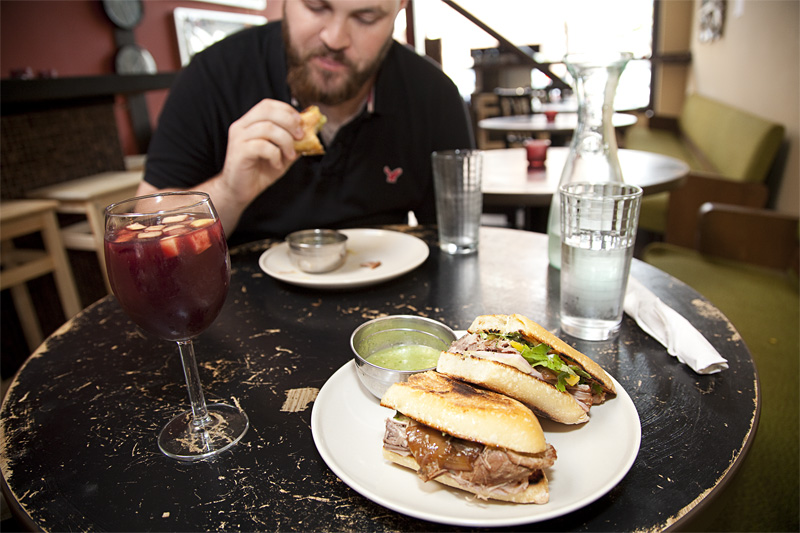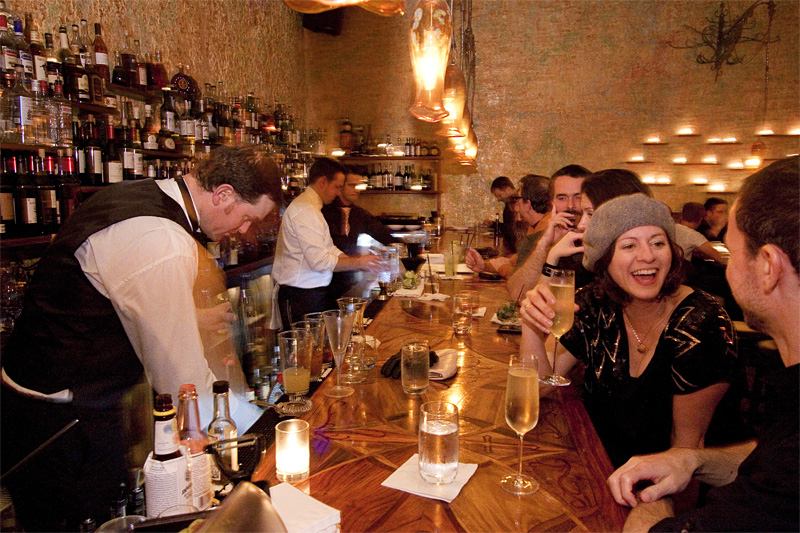America may own the hamburger, the muffuletta, and the Monte Cristo, but it does not own the entire sandwich genre. For some reason, the drive to press meats and condiments between pieces of bread is as universal as the drive to procreate or keep tabs on Brangelina. As Liz Lemon told Jack Donaghy in the Halloween episode of 30 Rock, “All of humankind has one thing in common: the sandwich. I believe that all that anyone really wants in this life is to sit in peace and eat a sandwich.”
This drive has resulted in such culinary tours de force as the Vietnamese banh mi, the Cuban medianoche, the Italian panino, the Mexican torta, the Belgian tartine, the Danish smørrebrød, the Taiwanese gua bao, the Bengal kati roll, and the British potted shrimp sandwich. Many of these global sandwiches can be found here in Seattle. But no matter how experienced the ‘wich hunter, there are always new and varied bread-meat-veg combos to try.
Take for example the Venezuelan bocadillos and arepas at Meza. Opened several months ago on 14th Avenue between Pike and Union, Meza serves Spanish tapas and South American sandwiches. It’s a tiny, steamy little place that has gotten a little more put-together each time I’ve visited (except for the horrifically sticky tables). There’s some flash to the place, with sparkly bronze tiles on the cooking station and an obsidian-colored chandelier, along with homelier signs of a DIY job: scuffed tabletops, mismatching chairs, poured-concrete floors, and—ugh—those tables. Putting together the muscular nudes in the light-box collage with the nekkid-torso paintings on the facing wall and the low-cut, V-necked ensembles I’ve seen on the strongman owner, a certain theme emerges: Bodies beautiful love Venezuelan roast pork. Turns out they can love it until 3 in the morning on weekends, somewhat of a coup for the body beautiful on a Capitol Hill bender.
One guiding principle should animate your visits to Meza: Stick to the Venezuelan sandwiches—especially the ones with pork. Do not be tempted away by the descriptions of scallops in reduced wine sauce, tortilla española, or even the green salad.
Arepitas (or little arepas) are cornmeal cakes, each the size and shape of a MoonPie and the color of polenta. Cooked in a device similar to a waffle iron, the arepitas come out with a pale, papery crust and insides the texture of a dense, not-quite-cooked brownie. Meza’s arepas are stuffed with everything from underripe avocados and unseasoned pink tomatoes (avoid this one) to a satisfyingly gooey but bland four-cheese blend to a mountain of shredded, braised pork. If you don’t come from a place where the arepa holds nostalgic appeal, they’re mostly worth tasting for curiosity’s sake. Much better: the bocadillos.
Meza’s pernil, or braised pork, is to your average pork chop what shoegazer is to Fleet Foxes: a full-onslaught, teeth-rattling rush of flavor. It is also key to everything that is good. The Havana bocadillo, for instance, is what results if you take Paseo’s Midnight Cuban and redraw it with a less expressionist hand: all the same pork-on-pork action, none of the gloop. At Meza, just enough of the roast pork to create a broad smear of flavor is then outlined in slim slices of ham and cheese, shadowed by mayonnaise, and highlighted with a few caramelized onions, cilantro sprigs, and slivers of tart pickle. Then the bread is press-grilled until its crust gives way to the teeth with a sharp crack, but it’s not so crisp that it slashes your gums as you bite through it.
The Galipán sandwich dispenses with the distraction of cheese, ham, and pickle. It’s a loving recreation of a sandwich from a tiny town in the mountains north of Caracas, the kind of street food Venezuelans make day trips for. Served with a metal cup of tangy tomatillo salsa for dipping, the press-grilled sandwich is stuffed with shredded pork, lubricated with slippery onions and a gush of aioli, and mysteriously held back from overwhelming richness by a few leaves of lettuce and tomato slices. Whether you’re in Venezuela or Seattle, the Galipán pork sandwich is a destination dish.
If the bocadillo is the My Bloody Valentine of the sandwich world, the Swedish smörgås (pronounced more like “smurgos”) is its Sufjan Stevens: delicately flavored, intricately composed, and awfully pretty to look at. If you visit the Swedish Cultural Center on Dexter Avenue for its Friday Kafe and happy hour (which starts at noon), the sandwiches aren’t the only sight. You and a half-dozen faded blondes in their 70s will be dining in the bar—Arne Jacobsen chairs, pale-blue carpet, and mid-century pendant lighting still in place—with a 180-degree, Canlis-like vista of Lake Union, all for the price of an $8 open-faced sandwich.
Kristina and Claes Båvik’s Svedala Bakery stand may have left Pike Place Market as of October 25, but the couple still sells pastries with Ikea-esque names (Tosca, Katalan) at Whole Foods. Since June, they’ve also been catering Fridays at the Cultural Center. On the day I went for a midday meal, the Båviks had prepared four types of smörgås for the refrigerated case, each as lovely as a bento box: a slim oval of rye with rippling curls of smoked ham and slivers of cornichon tucked into their folds; two slices of brie on thickly buttered bread with two slim apple slices arranged at angles upon them; smoked salmon garnished with a drizzle of sweet mustard, the tips of dill fronds, and shaved lemons; and a mound of penny-sized pink shrimp balanced on hard-boiled egg slices and a gratifying amount of mayonnaise. You eat a smörgås with a fork and knife as well as with your eyes, feeling not a little as though you should be having two martinis and a rubber of bridge with your meal. One smörgås, in fact, is not enough to feed a slightly overripe man in the prime of his eating years, so a cup of soup, a shared plate of Swedish meatballs for the table, or a domed wedge of Svedala’s princess cake is needed to finish off a meal. Perhaps even all three.
Price CheckMeza Arepitas $6 Galipán sandwich $8 Havana sandwich $9Swedish Cultural Center Smörgås $7–$8 Side of soup $2 Princess cake $3.50






